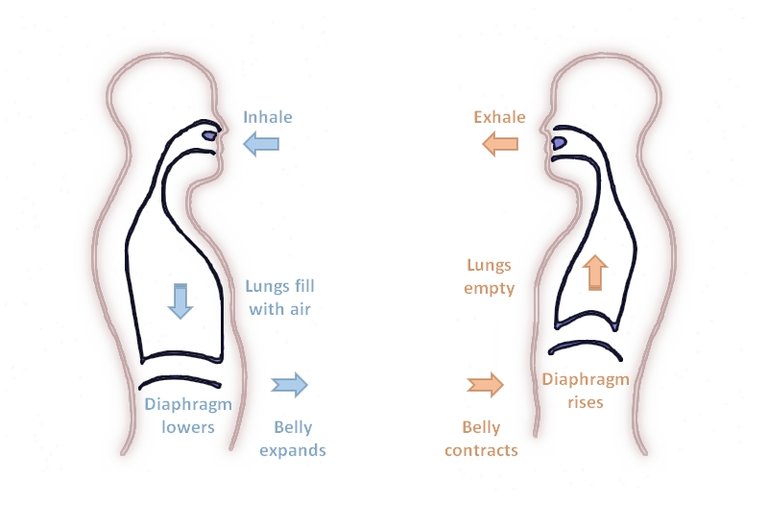In recent discussions across various media platforms, a surprising topic has surfaced: the way we breathe. It might sound strange, but experts suggest that many of us might not be breathing correctly. This raises several intriguing questions: Can one truly breathe incorrectly? Have we been breathing improperly all along? And if so, what is the right way to breathe?
Before we are able to establish answers to the questions above, let's talk about breathing, and how breathing works. When we breath, oxygen goes into the bloodstream and goes into the cells, also, when we breath, the sympathetic nervous system is activated which increases the heart rate and noradrenaline is released. When we breath in, the diaphragm expands and moves down stretching the heart and making it bigger which causes the blood to travel a little slowly and the brain sends a signal to speed up the heart rate.
When we breathe out, the diaphragm is reduced allowing the heart to expand, and blood flow to increase. The brain signals the heart not to slow down a little and we release carbon dioxide, triggering the parasympathetic system thereby calming us down. Evidence also shows that slow breathing is able to increase the activity of GABA neurotransmitter in the brain which also calm down nerves.
Talking about how to breath, according to an experiment titled "Brief structured respiration practices enhance mood and reduce physiological arousal" 4 different breath work groups were worked on, (1) cyclic sighing, emphasizing on prolonged exhalations; (2) box breathing, with equal duration of inhalations, breath retentions, and exhalations; (3) cyclic hyperventilation with retention, with longer inhalations and shorter exhalations; and (4) being control which is normal breathing. These 4 groups did this type of breathing for 5 minutes daily and they all saw improvement as they felt more positive, less stressed, and less anxious compared to the controlled group but the group with the biggest improvement was the long exhale breath work which is cyclic sighing.
You might just think breathing is a normal thing, but research has shown that breathing exercises help with conditions such as PTSD or Depression decreasing depression and PTSD. That said, some people like to breath with their mouth in contrast with breathing with their nose but studies shows that breathing with the nostrils is better than breathing with the mouth as it provides more oxygen to the blood as it helps to inflate the lungs more while providing less contaminated air into the body as the nose is capable of protecting against infections thanks to nose hairs and membranes that help moisturize and warm up the air.
Other important evidence of breath work is in pain management. Study shows that pain scores reduces with breath work training, and although the reason is still unknown it does happen. Also breath work helps with changes in health markers such as blood pressure reduction compared with certain types of exercise and drugs. Breathing can also help people strengthen their diaphragm and other breathing muscles as study shows that High resistance inspiratory muscle strength training (IMST) helps, although the inhalation is done through a handheld device that provides resistance in the other direction of breathing helping to reduce systolic blood pressure more than average.
These said, while the concept of 'breathing wrongly' might seem unusual, evidence suggests that there are indeed more and less effective ways to breathe. Cyclic sighing, in particular, stands out as a beneficial technique, offering significant stress reduction and mental health benefits when practiced regularly for just five minutes a day. While research continues to evolve in this area, trying this breathing technique could be a simple, no-risk way to potentially improve one's well-being.
Read More
https://www.cell.com/cell-reports-medicine
https://www.ncbi.nlm.nih.gov/books/NBK541120/
https://www.ncbi.nlm.nih.gov/pmc/articles/PMC9828383/
https://bmcpsychiatry.biomedcentral.com
https://www.colorado.edu/today/2021/06/29
https://med.stanford.edu/news/all-news/2021/07
https://www.ncbi.nlm.nih.gov/pmc/articles/PMC3353818/


